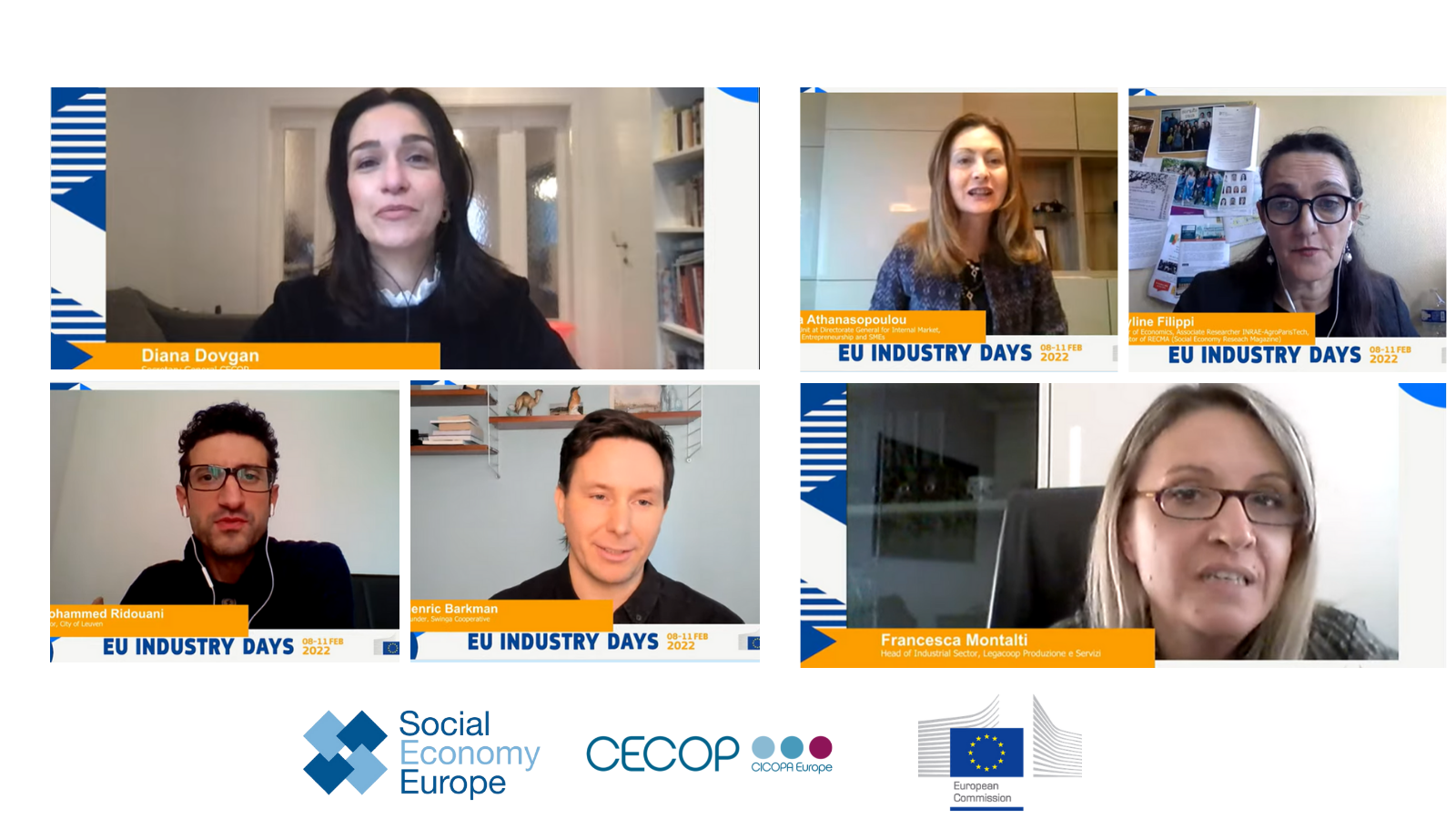
On February 8, 2022, CECOP participated in the “Proximity & Social Economy ecosystem” session of the EU Industry Days organized by the European Commission in partnership with CECOP and Social Economy Europe. The purpose of the discussion was to address the opportunities and challenges associated with the green and digital transition of the ecosystem, building public private partnerships, and opportunities for youth engagement.
The discussion was moderated by Diana Dovgan, CECOP Secretary General, and featured among speakers CECOP’s Vice-President Francesca Montalti (representing Legacoop Produzione e Servizi from Italy) and the founder of the Swinga cooperative Henric Barkman, who is affiliated with CECOP’s Swedish member, Coompanion. Panel’s other speakers included Anna Athanasopoulou, Head of Proximity, Social Economy, Creative Industries (GROW.G.2) Unit at the European Commission’s DG GROW; Mohamed Ridouani, Mayor of the City of Leuven; and Maryline Filippi, Professor of Economics & Associate Researcher at INRAE – AGROPARISTECH.
There was a broad consensus among the speakers on the importance of social economy for an inclusive green and digital transition in the EU, its attractiveness to the young people, and the need for policy support measures. Some of the key points addressed in the discussion include:
- Social economy has a significant economic and societal potential. As Diana Dovgan mentioned, there are 2.8 million social economy enterprises and organizations in the EU – from SMEs to large enterprises. They employ 13.6 million employees and account for 8% of the EU’s GDP. Anna Athanasopoulou reconfirmed that social economy certainly has a place on the EU policy agenda, and it matters to the EU economy and society when it comes to recovery, green and digital transition, which is why the European Commission is already working on developing the transition pathway for the Proximity and Social Economy ecosystem (3rd ecosystem out of 14 to start such work). According to Anna Athanasopoulou, social economy business models are valuable as the third way of addressing social challenges and generating growth when the market and even the state perhaps cannot address certain challenges related to social services, education, housing, green energy, finance and other issues.
- Social economy works towards an inclusive transition for everyone. As Mohamed Ridouani put it, the objective is not merely economic prosperity but also making sure that everyone benefits from it. Francesca Montalti also pointed out that this is why cooperatives and other social economy organisations face more challenges in innovation processes: because of their nature, they make a huge effort to engage everyone involved in the transition processes, including workers, with the objective of leaving no one behind.
- Social economy has the advantage of being very close to the people. As Maryline Filippi put it, social economy is strongly linked to the territory in which it operates and enables collective action shaped by local conditions. This local embeddedness makes it very suitable for experimentation on how to reconcile social and solidarity economy and ecological transition. Recently, the COVID-19 pandemic has shown that cooperatives, and also social enterprises and associations, are very powerful because they are very close to the members and help to support their needs. Similarly, Mohamed Ridouani noted that social economy is able to solve practical issues while respecting local conditions and ensuring sustainability. In Henric Barkman’s experience, by being inclusive, giving people a voice and showing that they care about more than profit, his cooperative Swinga has generated much higher community’s engagement with their service as well as offers to help. Francesca Montalti also pointed out that social economy organisations and traditional enterprises are closely interlinked, and in the last years, we have seen an increasing number of businesses being transferred to the cooperatives through worker buy-outs; this number will probably further increase in the future.
- Partnerships, and in particular public-private partnerships between authorities and social economy entities, are very important. Francesca Montalti noted that many cooperatives provide public services, so it is essential to bring forward public-private partnerships that are able to set common economic, social and environmental objectives and to assess their implementation and impact over time. Mohamed Ridouani discussed Leuven’s successful experience in building partnerships to promote sustainable economic activities, including via public procurement.
- Cooperatives and other social economy organisations need greater support. As Francesca Montalti noted, social economy organisations still lack visibility and suffer from fragmentation, which makes it difficult to access information and support and to attract talent and skills essential for transition processes. New financial instruments are needed, because capital is really important for large investments that are relevant to the transition for organisations like cooperatives or social economy organisations. The above-mentioned public-private partnerships also can help. Finally, implementation of the new EU Industrial Strategy should be supported by a stronger social dimension, and specific social key performance indicators (KPIs) should be developed and their implementation should be monitored over time if we want inclusive development. Maryline Filippi pointed out the need to support cooperative funds for start-ups, and to change the laws to support social economy. Henric Barkman noted that social economy needs both financing and increasing the awareness about the value of democratic economy models, in order for them to be seen as a viable economic model and a strategic choice for the economic competitiveness of the EU.
- Cooperatives and other social economy models offer valuable opportunities for young people. As Francesca Montalti noted, cooperatives in particular can be a solution for the needs of young people by offering an inclusive approach and quality jobs. Also in Maryline Filippi’s experience, young people are interested in cooperatives and social enterprises, as a way to develop good businesses with good jobs which also correspond to their values, but they need support and tools to engage.
Watch the video dicussion below.







 Employment & Social Inclusion
Employment & Social Inclusion  Entrepreneurship
Entrepreneurship

